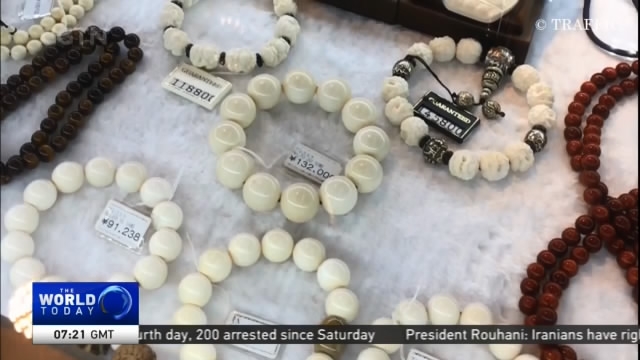
15:49, 01-Jan-2018
Japan Ivory Market: Government expected to impose tougher regulations

On the last day of 2017, China announced a ban on the ivory trade. This is expected to have a positive impact on wildlife in Kenya. But it seems the situation in Japan, which has a large domestic ivory trade, is very different. Our correspondent Terrence Terashima interviewed an official fighting the ivory trade. She refused to show her face on camera due to the sensitive nature of the issue. We have this report.
Although demands for ivory products are diminishing, it is said that Japan still has a large ivory market. Experts say it is partially due to the large quantity of ivory imports during the country's economic boom. According to a data, Japan imported as much as 6,000 tons of ivory from 1951 until ivory trade was banned in 1989. However, the government does not have clear documentation on the stock pile of these imported raw ivory.
TOMOMI KITADE PROGRAM OFFICER, TRAFFIC EAST ASIA-JAPAN "The fact that the government doesn't have the hold of the large stock pile in private ownership, and that is because under the current regulations whole tusks are required to be registered only when they are traded or given away, so all the tusks simply be possessed by individual without intensions to sale or trade or give away then they don't get accounted for."
With the aging society and diminishing local demands, increasing number of the older generations and companies begun disposing the stock piles. It is said that because of this, nearly 1,000 tusks are newly registered each year. Although Japan is eyeing to tighten its regulations, the focus is on the whole tusks not the products, under the current regulations it is hard to track the legality of transactions and products. Particularly in private and online trading.
TERRENCE TERASHIMA TOKYO "Because of the lax regulations, ivory made products are readily sold in the market, such as flee markets and even in shops in popular tourist locations."
It may seem that Japan might become a destination for illegal ivory, but the truth is that Japan is identified as a source of illegal exports.
TOMOMI KITADE PROGRAM OFFICER, TRAFFIC EAST ASIA-JAPAN "we have compiled records concerning Japan for period of 2010 to 2016 and we found over 2.4 tons of ivory were seized as illegal exports from Japan and 95 percent of these are going to China."
Number of people were caught trying to smuggle products out of Japan. Experts are calling for thorough measures in grasping the ivory stock pile in the country and regulate manufacturing and trade within Japan. A start in preventing the unaccounted stock pile ending up in black market. Terrence Terashima CGTN Tokyo.

SITEMAP
Copyright © 2018 CGTN. Beijing ICP prepared NO.16065310-3
Copyright © 2018 CGTN. Beijing ICP prepared NO.16065310-3